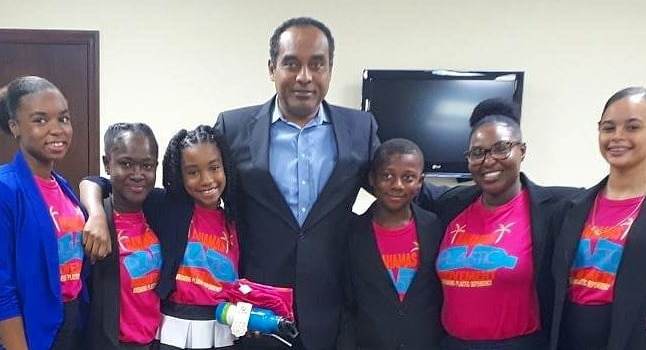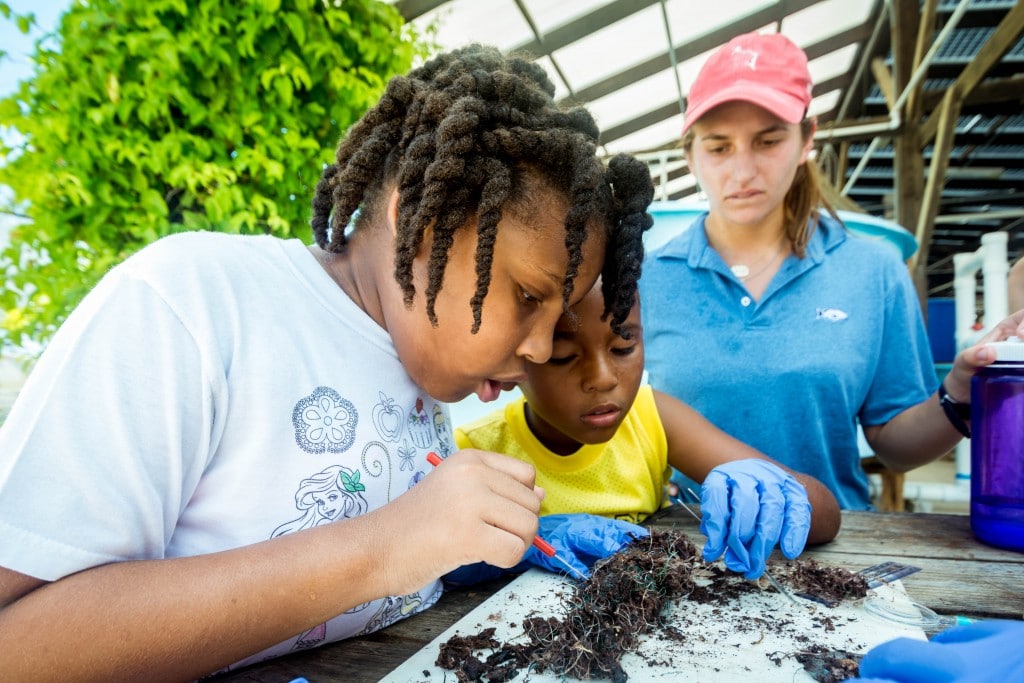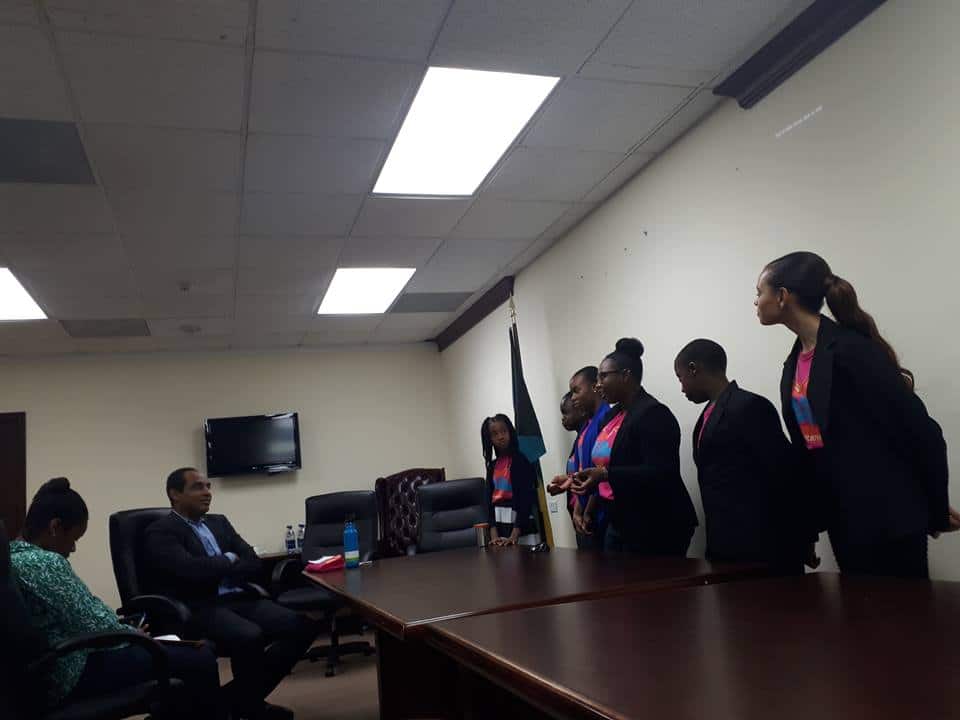Marine Life & Conservation
The Bahamas to Ban Plastic Bags

![]() On January 3rd, 2018, the Bahamas Plastic Movement’s youth delegation from the island of Eleuthera, travelled to Nassau, New Providence to meet the Minister of Environment and Housing, The Hon. Romauld Ferreira, to propose the need for a nationwide ban on plastic bags for the country. The self-proclaimed “Plastic Warriors”, members of the environmental NGO Bahamas Plastic Movement (BPM), visited the Ministry of Environment’s Charlotte House office in Nassau, where they presented a thorough presentation on the economic and environmental implications of plastic pollution in The Bahamas.
On January 3rd, 2018, the Bahamas Plastic Movement’s youth delegation from the island of Eleuthera, travelled to Nassau, New Providence to meet the Minister of Environment and Housing, The Hon. Romauld Ferreira, to propose the need for a nationwide ban on plastic bags for the country. The self-proclaimed “Plastic Warriors”, members of the environmental NGO Bahamas Plastic Movement (BPM), visited the Ministry of Environment’s Charlotte House office in Nassau, where they presented a thorough presentation on the economic and environmental implications of plastic pollution in The Bahamas.
Single use, disposable plastic items such as plastic bottles, straws, cups, styrofoam and plastic bags are known to be a nuisance in the environment. Plastic bags in particular are used in abundance within the country, globally up to 1 trillion plastic bags are used annually. Used on average for around 12 minutes, these extremely lightweight and aerodynamic plastic bags escape with the wind, evading trash cans and local landfills before eventually polluting our environment and finally making their way to the ocean before severely harming marine life such as whales, turtles and seabirds.
“In our country, single use plastic items are commonly used and is very bad for the environment because it is a non-biodegradable material, so it just persists in our environment for an extended period of time, especially on our beaches where they may deter tourists”, states BPM’s Ocean Ambassador Genderia Francis.
Approximately 70% of visitors to the Bahamas said that their decision to visit was influenced by its beaches. Recent scientific research suggests that if the rate of litter on a beach increases to 15 litter items per square meter, that would deter 85% of users, causing up to US$8.5 million in tourism losses annually. “Plastic bags are a major issue in this country as they are commonly used in businesses, so we wanted to confront this issue head on and propose a nationwide ban on plastic bags”, continued Francis.
Leading up to their meeting with Minister Ferreira, the students participated in a Youth Activism Workshop hosted by BPM. Over the course of four days, students learned to conduct social science surveys to gather data on the amount of plastic bags used by locals on a daily basis. They also learned about the legislative process of The Bahamas. After reviewing several case studies of countries around the world with effective plastic bag bans in place, the students successfully drafted a legally binding bill for a plastic bag regulation for The Bahamas, which was then presented to the Minister. The first phase of the proposed regulation requested a levy on plastic bags for businesses and an imposed plastic bag tax for consumers wishing to receive a plastic bag at the point of sale.
Combining their knowledge of plastic pollution with their research findings, proposed draft bill and effective communication skills, these plastic warriors successfully built an engaging and informative presentation that was a call to action for Minister Ferreira and a guide to leading The Bahamas “Towards a Plastic Free Future . Courageously, the “Plastic Warriors”, composed of, Charma Morley (15), Traliyah Carey (15), Glenderia Francis (16), Abigail Ramnarine (10) and Tarryn Johnson (14), marched into the Minister’s office and clearly outlined what action steps were required of the Ministry of Environment. The team recommended 1) a partnership between the Ministry of Environment and Bahamas Plastic Movement to launch a national plastic pollution education campaign, 2) The Hon. Romauld Ferreira, Minister of the Environment and Housing agrees to push legislation for a plastic bag ban in The Bahamas by the end of the first quarter 2018 and 3) The Bahamas agrees to join the UNEP Clean Seas Initiative which is a global Call to Action for governments to introduce regulations and incentives to tackle marine debris.
“Someone has to make the change for our generation and if we don’t do it, no one else will, so we have to be the voice of our community and make a change in society” says, Charma Morley, BPM Ocean Ambassador.
Following the presentation, Minister Ferreira, expressed his gratitude, contentment and pride for the courage and commitment displayed by the “plastic warriors”. To the surprise of the group, he proposed to ban plastic bags completely in The Bahamas, followed by various types of single use plastics such as Styrofoam. The Minister revealed that the Ministry of Environment has been working diligently on formulating and pushing regulations with Parliament that address plastic use in the country and agrees that through laws and swift action, we will be able to mitigate plastic pollution in The Bahamas.
At the 2018 Abaco Science Alliance Conference hosted by Friends of the Environment on January 4th, Minister Ferreira publicly announced his plans to move forward with a plastic bag ban for The Bahamas, joining a growing list of more than 40 countries who have already implemented plastic bag bans.
To learn more about the organization and ways to decrease your plastic footprint, visit www.bahamasplasticmovement.org.
Blogs
Invitation from The Ocean Cleanup for San Francisco port call

6 years ago, The Ocean Cleanup set sail for the Great Pacific Garbage Patch with one goal: to develop the technology to be able to relegate the patch to the history books. On 6 September 2024, The Ocean Cleanup fleet returns to San Francisco bringing with it System 03 to announce the next phase of the cleanup of the Great Pacific Garbage Patch and to offer you a chance to view our cleanup system up-close and personal.
We look forward to seeing you there.
To confirm your presence, please RSVP to press@theoceancleanup.com
PROGRAM
Join The Ocean Cleanup as our two iconic ships and the extraction System 03 return to San Francisco, 6 years and over 100 extractions after we set sail, to create and validate the technology needed to rid the oceans of plastic.
Our founder and CEO, Boyan Slat, will announce the next steps for the cleanup of the Great Pacific Garbage Patch. Giving you a chance to view our cleanup system and the plastic extracted.
Hear important news on what’s next in the mission of The Ocean Cleanup as it seeks to make its mission of ridding the world’s oceans of plastic an achievable and realistic goal.
Interviews and vessel tours are available on request.
PRACTICALITIES
Date: September 6, 2024
Press conference: 12 pm (noon)
Location: The Exploratorium (Google Maps)
Pier 15 (Embarcadero at Green Street), San Francisco, CA
Parking: Visit The Exploratorium’s website for details.
RSVP: press@theoceancleanup.com
Video & photo material from several viewing spots around the bay
We look forward to seeing you there!
ABOUT THE OCEAN CLEANUP
The Ocean Cleanup is an international non-profit that develops and scales technologies to rid the world’s oceans of plastic. They aim to achieve this goal through a dual strategy: intercepting in rivers to stop the flow and cleaning up what has already accumulated in the ocean. For the latter, The Ocean Cleanup develops and deploys large-scale systems to efficiently concentrate the plastic for periodic removal. This plastic is tracked and traced to certify claims of origin when recycling it into new products. To curb the tide via rivers, The Ocean Cleanup has developed Interceptor™ Solutions to halt and extract riverine plastic before it reaches the ocean. As of June 2024, the non-profit has collected over 12 million kilograms (26.4 million pounds) of plastic from aquatic ecosystems around the world. Founded in 2013 by Boyan Slat, The Ocean Cleanup now employs a broadly multi-disciplined team of approximately 140. The foundation is headquartered in Rotterdam, the Netherlands, and opened its first regional office in Kuala Lumpur, Malaysia, in 2023.
Find out more about The Ocean Cleanup at www.theoceancleanup.com.
Marine Life & Conservation
SHARK MONTH ARRIVES AT ROYAL WILLIAM YARD, PLYMOUTH

A shark has been spotted approaching Royal William Yard in Plymouth, much to the surprise of swimmers, paddleboarders and onlookers.
With its distinctive dorsal fin cutting through the water, the sizeable shark swam along the coastline, before turning to head inland towards Firestone Arch at Royal William Yard. The appearance drew a crowd, who were captivated for more than an hour by the unusual sight – and it was all caught on video.
The shark is one of many expected sightings at Royal William Yard over the coming weeks… because today marks the start of Shark Month!
In reality, the ‘shark’ spotted along the Plymouth shoreline was actually a custom-made model, created by the team at Royal William Yard and sailed underwater by Caroline Robertson‑Brown from the Shark Trust, who donned scuba diving gear for the occasion.
The stunt took place to launch Shark Month in style and draw attention to the work of the leading international conservation charity, which is based in Britain’s Ocean City. Spectators were reassured that the water was safe and many entered into the spirit of the performance, swimming or sailing alongside the shark.
Shark Month will take place across Royal William Yard throughout July and will feature an extravaganza of art, entertainment and advocacy for everyone to enjoy. The packed programme of events starts with an art exhibition and ends with a trip on paddleboards with shark experts – with everything from a shark quiz to a Jaws screening in between.
Paul Cox, CEO of the Shark Trust, said: “There are often assumptions and misconceptions when it comes to sharks. This was certainly the case with the shark spotted at Royal William Yard! While the British coastline is home to many species of shark, this was not one of them. However, we’re thrilled it caught people’s attention, because seeing a shark is a special and memorable moment. That is precisely why we want to celebrate these incredible creatures, highlight the need for conservation, and ask for help to safeguard their future.”
For more information about Shark Month at Royal William Yard, visit the Shark Trust Website.
Images and video: Jay Stone
-

 Blogs2 months ago
Blogs2 months agoDiving With… Nico, Ocean Earth Travels, Indonesia
-

 News1 month ago
News1 month agoMurex Bangka Announce New Oceanfront Cottages & Beachfront Dining
-

 Blogs2 months ago
Blogs2 months agoA new idea in freediving from RAID
-

 Marine Life & Conservation1 month ago
Marine Life & Conservation1 month agoIceland issue millionaire whale hunter a licence to murder 128 vulnerable fin whales
-

 Marine Life & Conservation2 months ago
Marine Life & Conservation2 months agoThe Shark Trust Great Shark Snapshot is back
-

 News3 months ago
News3 months agoCharting New Waters; NovoScuba Goes Global with the Launch of their Revolutionary Dive Training Agency!
-

 Gear News1 month ago
Gear News1 month agoNew Suunto Ocean – a dive computer and GPS sports watch in one for adventures below and above the surface
-

 Marine Life & Conservation Blogs2 months ago
Marine Life & Conservation Blogs2 months agoBook Review: Plankton






